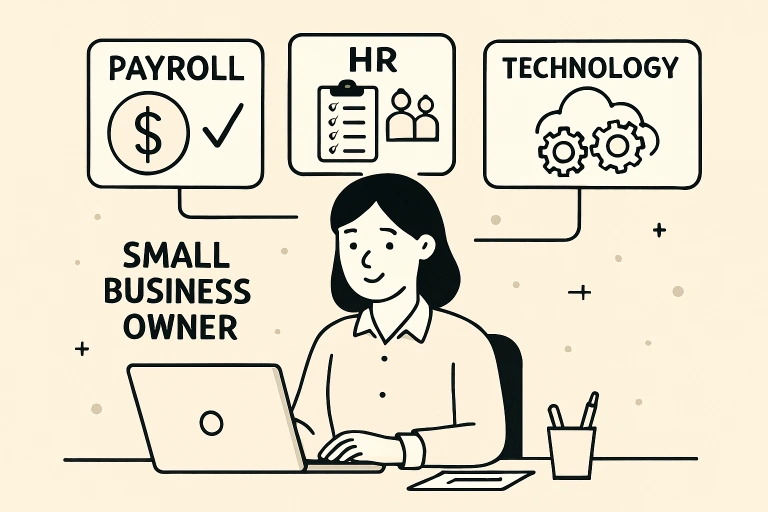Key Takeaways:
- Effective payroll and HR management drives small business success.
- Technology and automation can reduce compliance risks and save time.
- Scalability and integration should guide your decision on the solution to choose.
- Understanding employee needs shapes better HR decisions.
- Future-proofing your business means staying informed about the latest payroll solutions.
Why Payroll and HR Management Matter for Small Businesses?
Payroll and human resources (HR) management are foundational elements for every small business, directly impacting workplace satisfaction, compliance, and overall operational health. Maintaining precise payroll records and efficient HR practices helps foster trust, ensure timely payments, and ensure compliance with local, state, and federal regulations.
For small business owners, juggling compliance, taxation, and employee needs can be overwhelming without the aid of automated solutions. Errors and missteps can result in fines, decreased employee morale, and reputational damage. That’s why choosing the right provider is crucial for streamlining operations and fostering business growth.
Organizations that automate payroll and HR processes generally report fewer errors and can react quickly to changing regulations. This is particularly important for companies experiencing growth or shifting their operational models, as outdated or manual processes can expose the business to compliance risks and wasted time.
Beyond just compliance, efficient HR and payroll solutions enable you to focus on your core business, enhance employee experience, and cultivate a productive workplace environment. This, in turn, lays the groundwork for long-term success.
Selecting a payroll and HR solution should be approached with a clear understanding of your business needs and goals. User-friendly interfaces ensure even those with minimal payroll experience can manage employee data and regulatory requirements efficiently. Automation within these platforms significantly boosts accuracy and relieves your team from repetitive administrative tasks.
Customizable reporting, mobile accessibility, and self-service employee portals are increasingly standard features that offer both convenience and control. Look for platforms that enable seamless integration with your accounting software, benefits management systems, and time-tracking systems. These functionalities minimize manual data transfers, enhancing both accuracy and efficiency.

Technology Trends Reshaping HR and Payroll.
Modern payroll and HR technology has shifted toward cloud-based solutions, giving teams real-time access to data securely from anywhere. Additionally, mobile applications enable employees to view pay slips, request time off, and update their details independently, thereby eliminating bottlenecks and enhancing engagement.
Artificial intelligence (AI) is another significant advancement. AI-powered platforms can analyze trends within your workforce, automate complex compliance calculations, and even predict HR needs, saving your business resources and reducing the risk of costly errors.
These innovations enable even smaller businesses to access powerful, enterprise-level HR and payroll tools that were previously cost-prohibitive. Leveraging today’s technology can position your organization for agility and adaptability as your business evolves.
How to Evaluate and Compare Solution Providers?
Breaking down costs versus value is essential as you consider monthly fees, setup charges, and ongoing support versus the platform’s capacity to reduce errors, mitigate risks, and free up staff time. Don’t forget to verify security measures, as robust data encryption, regular system updates, and compliance certifications are essential to protect sensitive information.
Customer support quality is equally important. Opt for providers who offer responsive service, clear guidance for onboarding, and troubleshooting across multiple channels. Peer reviews and testimonials can offer valuable insights into real-world support experiences, and resources like Business News Daily can help you better understand the balance between payroll solutions and overall labor demands. Taking the time to compare multiple providers ensures you find a system that aligns with your company’s growth. In the long run, a well-chosen payroll solution becomes more than just a tool—it becomes a driver of efficiency and employee satisfaction.
The Importance of Scalability.
As your business grows, your HR and payroll needs will become more sophisticated. Many small businesses make the mistake of adopting solutions that fit their current size, only to outgrow them within a year or two, leading to system migrations that are both costly and time-consuming.
Future-proofing your selection means prioritizing scalability. Evaluate how well a system can scale with increased employee numbers, new locations, or additional features. Seamless integration with your accounting and benefit platforms ensures that tools evolve with your operational needs, not against them.
Common Pitfalls When Choosing Payroll and HR Systems.
One of the most frequent mistakes is underestimating compliance requirements. Payroll regulations change frequently; small businesses that lack automated compliance tools often find themselves on the wrong side of the law—not because of malice, but because manual processes fail to keep pace.
Another misstep is neglecting the importance of employee usability. Platforms that are difficult for staff to interact with lead to more help desk tickets, frustration, and decreased efficiency. Prioritizing solutions designed with user experience in mind is non-negotiable.
Future Trends Every Small Business Should Watch.
HR and payroll are continually evolving. In the coming years, expect advancements in machine learning, predictive people analytics, and the expansion of mobile-first platforms. These trends will allow business leaders to make proactive, data-driven decisions and improve workforce satisfaction.
Staying current with technology and compliance not only streamlines operations but also provides the insights necessary for growth and resilience in fast-changing markets. The small businesses that thrive will be those that adapt early and invest in robust, scalable HR solutions.
Conclusion.
Payroll and HR management are no longer just administrative necessities for small businesses. They are strategic tools that directly influence efficiency, compliance, and employee satisfaction. By embracing automation, cloud-based platforms, and scalable solutions, business owners can reduce errors, stay ahead of regulatory changes, and enhance the experience for their teams.
Ultimately, choosing the right system is not only about meeting today’s needs but also about positioning the business for long-term growth, resilience, and success in an evolving marketplace.

